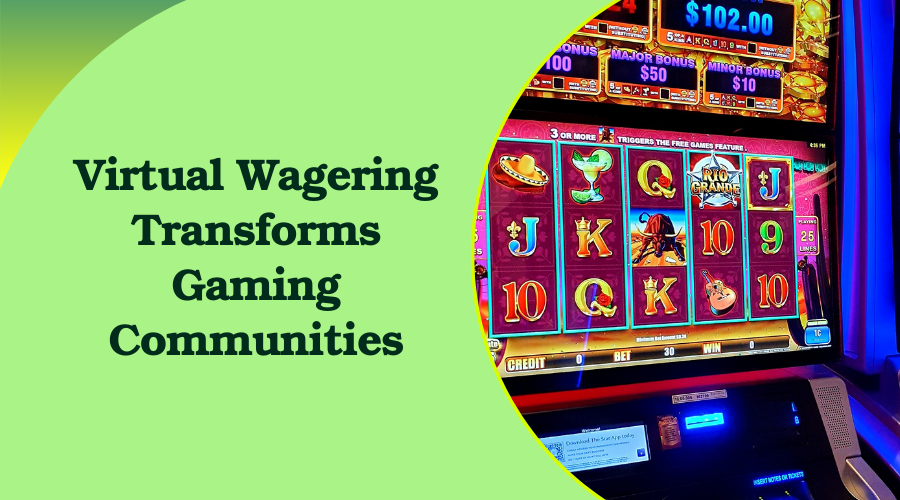Social Betting Revolution: Virtual Wagering Transforms Gaming Communities

The digital entertainment landscape is undergoing a seismic shift as virtual wagering reshapes how players engage with games, each other, and betting itself. Social betting, a unique fusion of online gaming and interactive wagering, builds stronger communities and creates new ways for players to compete, collaborate, and connect. What once seemed like a fringe novelty has become a central pillar of the modern gaming experience.
Social wagering is about more than the thrill of winning unlike traditional betting. It centers on community engagement, real-time interaction, and shared experiences. As virtual environments grow more immersive and technologies like blockchain and mobile accessibility evolve, the impact of social betting is transforming online gambling into a more inclusive, communal, and entertaining experience. This shift is also evident in how users are engaging with sports through modern platforms that prioritize interaction and entertainment over solitary play.

150% Bonus - Reduced Juice

$250 in Free Bets

$750 Bonus - Tons of Betting Options
What Is Social Betting?
Social betting, often called virtual wagering, integrates real or simulated betting with social interactions. Instead of isolated bets made behind screens, players are now placing wagers in environments that support chatrooms, leaderboards, shared goals, and influencer engagement.
These interactive spaces allow users to cheer each other on, discuss strategies, and even bet cooperatively. From esports and fantasy leagues to digital casinos and virtual sports, social betting redefines wagering by making it a group activity. Gamification elements, such as badges, personalized challenges, and community rewards, keep engagement levels high and encourage repeat participation.
The adoption of blockchain and cryptocurrency adds another dimension by enhancing transaction security and allowing borderless betting. Platforms like Unikrn and BetBull exemplify this trend by offering seamless interfaces, crypto payment options, and robust social features that mimic real-world interaction in virtual settings.
How Technology Is Powering the Shift
The rise of social betting is closely tied to technological advancement. Sophisticated platforms now support live-streamed events, interactive betting dashboards, and peer-to-peer wagering, all accessible from smartphones. These innovations make betting more accessible and entertaining, turning it into shared digital recreation.
Real-time odds, predictive analytics, and AI-driven matchmaking allow users to place smarter bets while enhancing the gaming environment. Peer-to-peer models are particularly influential, letting users set their betting terms and challenge friends or community members directly. Platforms that minimize or eliminate fees are gaining traction by giving players more control and better returns.
Cryptocurrency and blockchain solutions are integral to this shift. They enable faster, secure transactions and create transparent systems that players can trust. This is especially valuable in competitive gaming, where fairness and integrity are paramount.
The Impact on Gaming Communities
Virtual wagering has created vibrant digital communities where competition is matched by camaraderie. Rather than gambling in isolation, players now join immersive social networks built around shared interests and experiences.
Building Connections Through Betting
Platforms like PokerStars’ Vegas Infinite and BetBull integrate chat features, community betting pools, and friend-tracking tools to foster connection. These features transform passive gameplay into an active, social activity. Users can watch live streams, engage in real-time discussions, and celebrate wins together, creating a sense of belonging and mutual excitement.
Influencers and streamers also play a vital role. By broadcasting their betting strategies and community interactions, they help draw in new users and promote engagement. This fusion of content creation and gambling has proven to be a powerful catalyst for community growth.
Enhancing Competition and Player Engagement
Gamified elements such as leaderboards, achievements, and rewards systems intensify engagement by giving players goals to pursue beyond financial winnings. Peer-to-peer betting increases personalization, allowing for head-to-head challenges that feel more like friendly competition than traditional gambling.
Blockchain’s ability to verify outcomes and transaction histories adds another layer of trust, ensuring a level playing field across competitive formats. These features encourage repeat use and increase time spent on platforms, ultimately strengthening user loyalty.
Advantages of Social Betting
Social betting's growth is driven by clear advantages that benefit both players and operators. From user accessibility to improved safety, virtual wagering redefines what it means to place a bet online.
Convenience and Accessibility
Players can engage in betting activities from anywhere with most platforms available via mobile apps and web portals. Live streaming, push notifications, and seamless app functionality make real-time participation easy and enjoyable.
This accessibility has expanded the reach of virtual betting to broader demographics, including casual gamers and sports fans. Whether someone is engaging in fantasy football pools or trying their hand at slots in a UBet online casino, social betting platforms provide multiple entry points tailored to varying interests.
Safer and More Transparent Experiences
Many social betting platforms are built with safety in mind. Licensing bodies such as the UK Gambling Commission enforce strict standards on operators. Age verification, spending limits, and community reporting features are widely adopted to promote responsible gaming.
Blockchain further enhances transparency by logging all transactions and outcomes on an immutable ledger. This helps prevent fraud, reinforces fairness, and boosts user confidence, particularly important in cross-border or crypto-based environments.
Industry Challenges and Considerations
Despite its advantages, the social betting revolution faces hurdles related to regulation, player safety, and ethical concerns. These issues require proactive management to ensure sustainable growth.
Regulatory Ambiguity
The legality of social betting varies across regions. Platforms using virtual currencies often operate in grey areas where regulation is minimal or inconsistent. While some claim to offer safer alternatives to real-money betting, a lack of oversight can lead to legal scrutiny and trust issues.
Platforms must adapt to shifting standards as more countries revisit their gambling laws. This includes complying with advertising restrictions, ensuring user protections, and developing transparent terms of service.
Risk of Problem Gambling
The immersive nature of social betting can blur the lines between entertainment and addiction. Gamified features and aggressive advertising may lead to excessive behavior among younger users. Studies have shown a link between social casino games and an increased likelihood of transitioning to real-money gambling.
To counter this, platforms must invest in stronger responsible gaming tools, including self-exclusion options, behavioral tracking, and education campaigns. Community-driven support groups and forums can also provide helpful resources for those at risk.
Future Outlook and Global Growth Potential
As interest in social betting continues to rise, the future looks promising. Innovation will remain the cornerstone of industry expansion, supported by global connectivity, mobile growth, and evolving user expectations.
Emerging Innovations
The next wave of social betting platforms will likely include advanced AI personalization, AR-enhanced live events, and deeper social integration. Tools like friend challenges, group betting competitions, and shared jackpots are becoming standard. Peer-to-peer exchanges with custom pricing, such as those offered by BettorEdge, represent a move toward user-driven ecosystems.
These innovations improve user experience and increase retention and monetization opportunities for operators. Transparency, fairness, and trust will be at the heart of successful platforms in the future.
Global Expansion
With increasing smartphone penetration and relaxed regulatory frameworks in many countries, social betting platforms are well-positioned for global reach. Events like the Global Gaming Expo and continued development of crypto infrastructure help unify standards and promote cross-border cooperation.
Emerging markets in Asia, Latin America, and Sub-Saharan Africa are becoming key targets due to growing digital literacy and gaming enthusiasm. As infrastructure improves, these regions are expected to drive significant user adoption.
Conclusion
The social betting revolution is transforming online wagering and redefining how people interact, play, and compete in digital spaces. By merging gaming with social connectivity, platforms create experiences beyond traditional gambling. Whether through peer-to-peer wagering, influencer-led communities, or crypto-enhanced gameplay, virtual betting builds stronger, more engaged user bases.
As UBet online casino and similar platforms continue to innovate, the future of virtual wagering promises even more immersive, secure, and community-focused experiences. The path forward involves balancing growth with responsibility, ensuring that the evolution of social betting remains as sustainable as it is exciting.
Chat 
Rules
The goal of chat is to talk sports and sports betting! Help each other by sharing picks and having a good time!
Below will not be tolerated
You can chat about most things to a certain extent. Exception is absolutely NO talking about Religion or Politics.
- There will be NO talking about others or their families
- There will be NO name calling.
- There will be NO rambling on or repeating the same thing over and over.
- There will be NO racist or sexist comments.
- There will be NO posting of other websites.
Basically treat others the way you would like to be treated.
Break the rules

- 1st warning a 24 hour ban
- 2nd warning 7 day ban
- 3rd warning a lifetime ban




